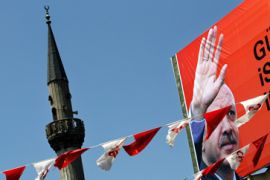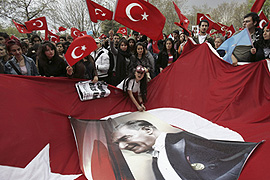Q&A: Turkey’s elections
Sunday’s vote for a new parliament is seen as the most important in years.

 |
Why are the elections so important?
An exceptionally high turnout of voters is expected on July 22 – the day polling takes place to elect a new parliament.
|
| ||
|
|
The polls are seen as the only way to resolve a standoff between the country’s ruling Justice and Development party (AK) and the country’s secular elite, including the army.
The run-up to the vote has exposed sharp divisions in Turkey’s young society (over two-thirds of the population are under 35), with religious conservatives and those for secular democracy in the country founded by Kemal Ataturk ranged against each other.
Hundreds of thousands of people have rallied in cities across the country in the last few months in support of secularism.
Opponents of the ruling party accuse the government headed by Recep Tayyip Erdogan, the current prime minister, of harbouring a desire to erode the separation between state and religion.
An army statement recently accused the government of tolerating radical Islam and vowed to defend secularism.
The government, however, denies the allegations. But it does say it will allow greater religious expression, ending a ban on wearing headscarves in civic areas.
 |
| Rallies in support of secularism were held earlier in the year [AFP] |
The debate over secularism has hindered efforts in parliament to elect a successor to Ahmet Necdet Sezer, the country’s president, whose term expired on May 16.
A parliamentary vote to elect the new president in early May was declared invalid, on the grounds that a mandatory two-thirds majority could not be met due to a boycott by opposition parties.
Abdullah Gul, the foreign minister, was opposed as the AK party’s presidential candidate given his religious past and that his wife wears a headscarf.
What are people voting for?
The Grand National Assembly of Turkey has 550 members, elected for a five-year term based on proportional representation.
The president is elected for a seven-year term by the parliament.
About 42.5 million of the country’s 74 million people are eligible to vote. The relatively young age of the population means that four million people will be able to vote for the first time.
Turkey has a multi-party system, a total of 14 parties and 7,395 candidates are contesting the vote.
 |
| A party needs 10 per cent of the vote to enter parliamnet [AFP] |
Parliament is traditionally dominated by two or three strong parties and often a fourth party that is electorally successful.
This is in part due to a party needing 10 per cent of votes cast nationally in order to enter parliament, one of the highest thresholds in the world, meaning many smaller parties are often not represented in the legislature.
Who are the main parties and figures?
The Justice and Development party headed by Erdogan is expected to win a majority in Sunday’s vote. Erdogan has said he will quit politics if his party fails to win the election.
The party was formed in 2001 by members of Turkey‘s Islamic movement and is distrusted by secularists in Turkey because of this religious past. Erdogan himself served a brief prison sentence in 1999 for reading a poem that was deemed too “Islamist” at a public rally.
Erdogan, a former mayor of Istanbul, has presided over strong economic growth during his premiership and his foriegn minister, Abdullah Gul, has earned respect for leading the coutry’s bid to join the EU. Gul has said he will still be the party’s candidate for the presidency after the elections.
| Special report | ||
|
The Republican People’s party is the main secular opposition party, led by Deniz Baykal, a former foreign minister, who has been accusing the AK party and Erdogan of undermining Turkey’s secular system. The party is the oldest in Turkey and was formed by Mustafa Kemal Ataturk.
The Nationalist Action party is a far-right party led by Devlet Bahceli which is expected to return to parliament after a five-year absence. The party is sceptical about Turkey‘s EU bid, accuses the government of being too soft on separatist Kurdish groups, and supports a military incursion into northern Iraq to crack down on Kurdish rebels based there.
The Democrat party is a secular, centre-right party led by Mehmet Agar, a former police chief and interior minister.
The Youth party is a nationalist party led by Cem Uzan, a businessman and the Democratic Society party is the country’s main Kurdish party.
How influential is the army in Turkish politics?
Turkey has one of the largest armies in the world with more than a million troops under its command. It is second only in size to Nato.
The army has carried out four coups in the past 50 years – in 1960, 1971 and 1980 – and in 1997 it intervened to force out Necmettin Erbakan, Turkey’s first Islamist-rooted prime minister, from power.
What are the main issues that the new government will have to deal with?
 |
| Erdogan has said he will quit politics if he loses [AFP] |
As well as the issue of religious expression, issues facing the government will largely focus on the country’s relations with the EU and with its Kurdish minority.
Under a previously agreed schedule, the leaders of EU member states are expected to decide whether to open accession negotiations with Turkey at a summit on December 16.
Turkey was given candidate status for EU membership in 1999 and analysts say that Turkey‘s membership bid confronts the EU with a challenge unparalleled in the EU’s history.
The commission’s “yes” has conditions attached.
Among others, it raised the possibility of the suspension of talks “in case of serious and persistent breaches of democracy”.
Turkey has the support of Germany, the UK, Italy, Portugal, Spain, Sweden, Greece, the Czech Republic, Poland, Estonia and Latvia at the December meeting. However, doubts have been voiced by Austria, Cyprus, Denmark, France and the Netherlands.
Meanwhile, opponents appear inclined to opt for a “third way”, under which the EU would offer a “special partnership” status to Turkey. Ankara has rejected such alternatives.
The outlawed Kurdistan Workers Party (PKK), branded a terrorist group, has increased attacks on military and civilian targets. Turkey recently increased the number of troops in the border area with Iraq and some politicians have called for incursions into Iraq to attack PKK rebels based there. It is an issue that would engage Turkey’s new government.
